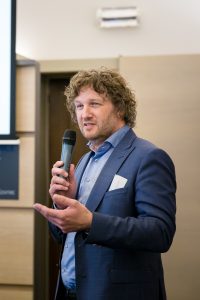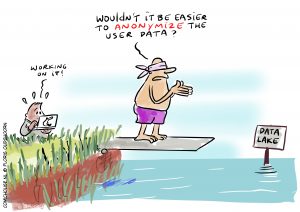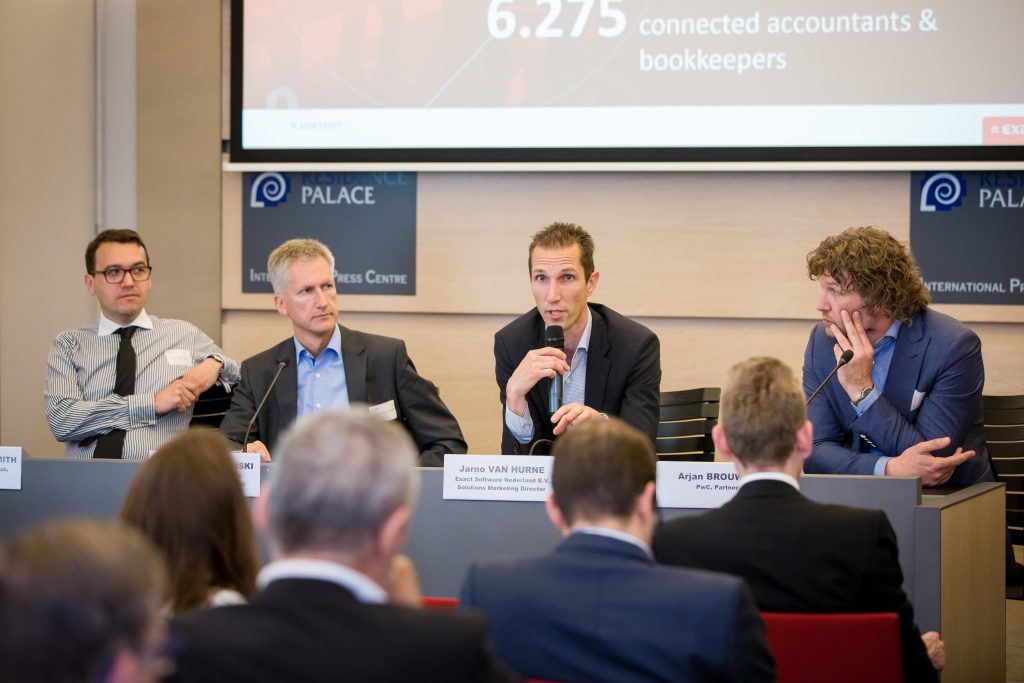5 September 2018 — News
Accounting: reporting from input to output

Speakers: Jarno Van Hurne (Exact Software, Solutions Marketing Director); Martin Naraschewski (SAP, Solutions Manager); Thomas Toomse-Smith ( (FRC) Financial Reporting Lab, Project Director)
Session moderated by Arjan Brouwer (PwC, Partner)

The objective of the session was twofold. First, we focused on how technology changes the way data enters and is processed by accounting systems. We highlighted both the related advantages of these developments for all parties involved and the practical impact of these developments on the accountancy profession. Secondly, we discussed how technology and other developments such as non-financial information reporting is changing the way company information is reported to stakeholders.
Arjan Brouwer moderated the discussion and kicked off the session with the statement:“reporting is an art and not a science”. Reporting of the future will still need human intervention, for example when judgement is to be applied, despite the technological revolution.
Accounting processes become more and more digital. The accountant’s role changes accordingly: he becomes more of an account manager, i.e. providing added value services to their clients. This will help SMEs make better business decisions concerning financing and mergers & acquisitions, highlighted Jarno Van Hurne.
The moderator asked whether manual entries would disappear completely going forward. For Mr. Van Hurne certain manual entries would still be processed in the future. Entries related to provision accounting, which require the involvement of specialists, are an example of such manual entries.
The audience also wondered what to do with all the data captured by accounting systems. Should it be made publicly available in a ‘data lake’ on an anonymous basis?

According to Martin Naraschewski automatisation is the first step. ‘Intelligence’, i.e. using the collected data to advise businesses, will be the next step. Diving into the details in real time, running simulations, proposed accounting entry options by the software in the context of complex transactions and suggested answers by the system to questions from stakeholders are examples of such business intelligence opportunities. Mr. Naraschewskiadded that there is however still a long learning curve ahead considering the involved challenges.
To the moderator’s question on how to deal with controls in a highly automated environment, Mr. Naraschewski replied that controls based on sampling of automated transactions could be an appropriate solution. Mr Brouwer wondered whether innovation is possible in the highly regulated external corporate reporting scene. Mr. Naraschewski stated that Integrated Reporting is best practice. Online reporting, automatic data transfer to tax authorities and XBRL are also examples of promising innovations.
The implementation challenges of IFRS 9 Financial Instruments, IFRS 15 Revenue from Contracts with Customers, IFRS 16 Leases and GDPR were covered as well. The implementation of those new requirements is very labour intensive according to the panellists. Certain new accounting principles, stipulated in the aforementioned accounting standards, are still being analysed by specialists in view of their practical application. Software companies still need to develop solutions to deal with the new requirements. Companies will have to update their processes: work-around solutions in the short term and increased automation in the longer run.
Reporting is still mainly a paper-based concept according to Thomas Toomse-Smith and certain reporting issues are linked to the paper format, for example the disclosure overload.
The FRC Financial Reporting Lab is currently exploring the opportunities of different technologies in the context of its Digital Future project: XBRL, European Single Electronic Format (ESEF), blockchain, artificial intelligence and augmented (virtual) reality. What are the expectations of technology? The UK Lab is in the process of comparing the different technologies based on their characteristics: production, distribution (e.g. free access to data is key) and consumption (e.g. contextual information is important).

Mr. Toomse Smith shared some lessons learnt from the UK Lab’s future of corporate reporting journey: new thinking in the reporting scene is required, non-paper reporting is the way forward and we should support innovative initiatives.
The session was concluded with Arjan Brouwer‘s statement “Accountants can save the world”: preparers should measure beyond financial performance indicators, for example they should also disclose their carbon emissions. Sub-optimal decisions are sometimes taken currently because certain important – non-financial – performance metrics are not measured.